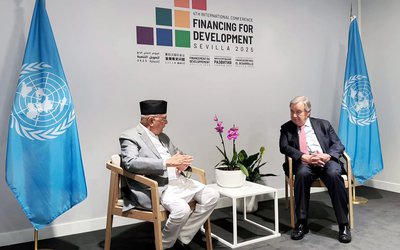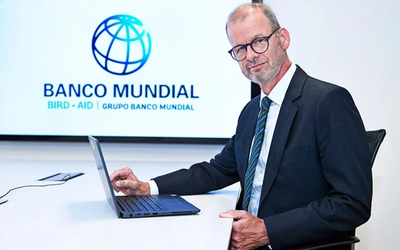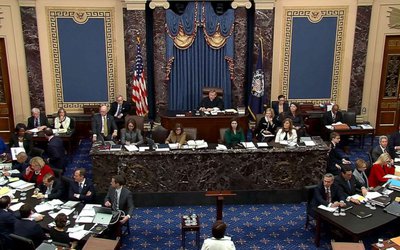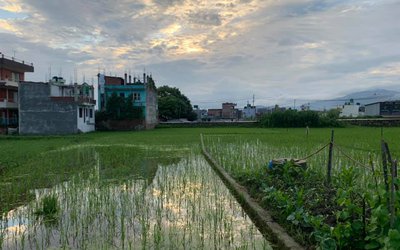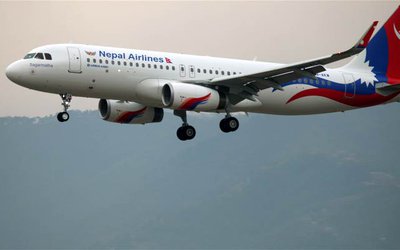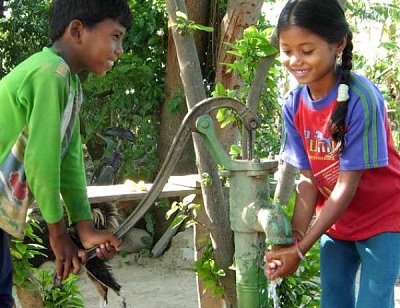
Thirty-year old Hari Krishna Chaudhari, a resident of Jamune tole of Tikapur Village, 600 kilometers west of capital Kathmandu, has reasons to rejoice. After receiving technical and other support from SWASTHA, programs for healthy home and healthy lives, Chaudhari built a toilet.
SWASTHA also helped him to bring a filter to make drinking water clean and safe to drink. A Colloidal Silver (CS) filter at his home helps his family avert the danger of water-borne diseases, which were common in the past.
The toilet has helped many people like Chaudhari to live in healthy homes and healthy lives. At a time when Nepal is celebrating the World Water Day 2014, by organizing various programs, Practical Action Nepal has supported a large number of people with small interventions with big implications to health and hygiene.
Marginalized and poor people like Chaudhari have benefited a lot from the programs implemented under the SWASTHA Project in Tikapur of Kailali. The project also helped bring drastic changes in the livelihood of the poor and vulnerable people living in Chitwan District.
“Our SWASTHA project community in Chitwan has been declared the first healthy community in Nepal. With the overall approach in improving the sanitation condition of the community, the declared community now has safe drinking water, improved sanitation conditions, better hygiene practices, proper waste management and better kitchen management,” said Achyut Luitel, country director of Practical Action.
Under Urban Waste, Water and Sanitation program, Practical Action is now working to improve the health of 150,000 urban residents, through increased awareness, providing access to safe drinking water, better sanitation facilities, waste services and proper solid waste management, and practicing safe and hygienic behavior.
At a time when there is a debate over use of water for various purposes during the World Water Day 2014, Practical Action has shown a way to use water as a solution in various sectors, such as in generating power through micro-hydro, small irrigation, drinking water and sanitation. One of the beauty of the project launched by Practical Action-Nepal is that all of them are small. In keeping with the ideals of its founder and economist Dr. E.F. Schumacher, author of Small is Beautiful, Practical Action Nepal has been making efforts to reduce the poverty through the wider use of small and appropriate technologies.
As climate change is gradually creating a lot of problems in the life of rural poor population, Practical Action has already established itself as a lead organization in the disaster risk reduction areas through its Community Based Early Warning Systems.
Compared to other big organizations, the effort of Practical Action is small but it has bigger impacts in the society, as all its programs can be replicated. “International non-governmental organizations like Practical Action have already shown that they can bring drastic changes in the livelihood. After implementing various projects and programs, Practical Action has already proved that it has a way to make the optimum use of water,” said Rabindra Kumar, member secretary of Social Welfare Council, regulatory authority of NGOs and INGOs in Nepal. “It has been implementing its programs in line with the objectives of the government of Nepal in the water sector.”
As Nepal’s current three years plan also stresses a greater role for national and international civil society organizations in the areas of water and sanitation, international non-governmental organizations like Practical Action can contribute a lot.
“The government of Nepal will encourage the international non-governmental organizations like Practical Action-Nepal in the areas of improving access of water and sanitation. National Planning Commission is well aware about the projects and programs launched by Practical Action Nepal to improve the rural water and sanitation,” said Dr. Rabindra Kumar Shakya, vice chairman of National Planning Commission.
In early days, Practical Action had shown how to develop micro-hydro to increase the efficiency of rural livelihood projects, showing that water can be the source for sustainable clean energy in the rural parts of Nepal. At a time when a large number of rural Nepalese are facing severe health problems due to lack of adequate water for proper sanitation, Practical Action has offered some functioning solutions.
- MELAMCHI WATER SUPPLY: No Interruption During Monsoon
- Jun 25, 2025
- KOREAN RETURNEES: Successful Integration
- Jun 25, 2025
- UPPER TRISHULI-1: Engaging With Local
- Jun 25, 2025
- IME GROUP: Twenty Five Years Of Journey
- Jun 24, 2025
- NEPAL’S AIR POLLUTION: A Growing Health Concern
- Jun 24, 2025

